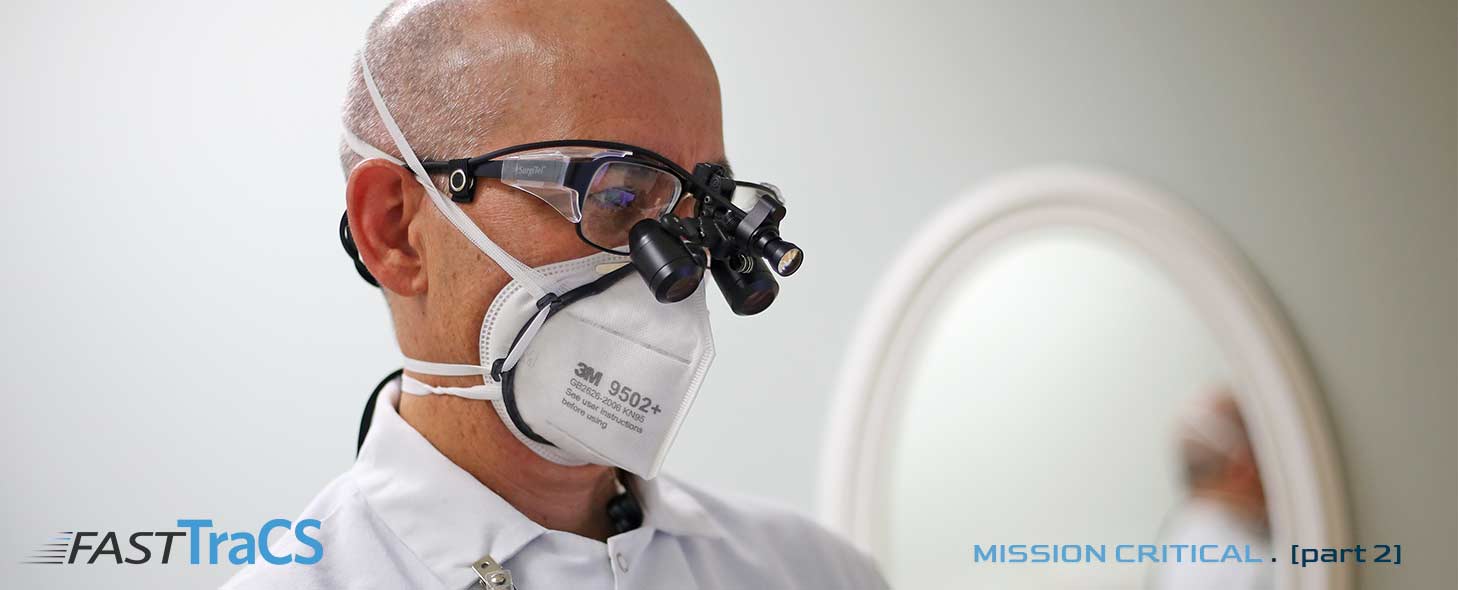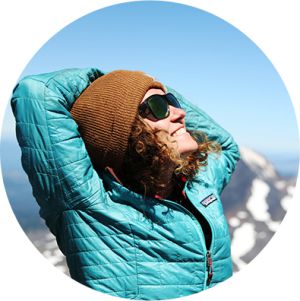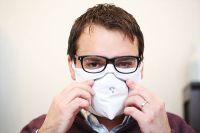
Mission Critical [Part Two]: Make it Accessible
FastTraCS is a small group of biomedical engineers within the North Carolina Translational and Clinical Sciences Institute who support UNC Health physicians, nurses and staff by identifying problems in clinical settings and creating innovative, technological solutions.
In this special series, we cover how the team is responding to the ongoing COVID-19 crisis.
In March, Devin Hubbard's days were filled with phone calls, Zoom meetings, and design tests as he and his team at FastTraCS worked around the clock to engineer new Personal Protective Equipment (PPE) designs in response to COVID-19.
Ten months later, as millions of Americans adjust to the "new normal" of pandemic life, Hubbard and his colleagues are busier than ever. They have successfully engineered a frame that can improve both the fit and comfort of existing face masks.
Now the goal is to make this specialized frame accessible to as many people as possible.
"We want to enable companies and clinics to re-open and function safely while the pandemic is still ongoing," Hubbard says.
The most efficient way to do this, it turns out, is to start a new company.
The ingenuity of mask frames
Even with COVID-19 vaccines on the horizon, Hubbard (along with medical professionals around the world) believes wearing masks will continue to be a part of daily life for the foreseeable future.
But why has his team focused on creating a specialized frame for masks? What benefit does it provide?
For starters, multiple studies have confirmed that better fitting masks offer better protection. Phillip Clapp, a researcher at the Mucociliary Clearance and Aerosol Research Laboratory in the UNC Center for Environmental Medicine, Asthma, and Lung Biology, and his team have been studying mask designs closely.
"Unlike respirators, medical masks are not designed to fit tightly to the wearer's face," he says. "Our data clearly show that the limited fit of medical masks impacts how well these products function as PPE."
The AerFrame is designed to improve fit by reducing gaps on the face. It can be worn over almost any type of mask and reduces the likelihood that glasses will fog. It is also reusable.
Adaptable. Comfortable. Durable. The AerFrame has many benefits, but perhaps the strongest selling point is how it prevents glasses from fogging. Fogged glasses are not just annoying—they can also pose risks, from working on a factory floor to simply walking out the front door on a cold day.
"We've heard reports of people getting injured from their glasses fogging," Hubbard says. "Especially as we go through winter months here in the northern hemisphere, the AerFrame can really help with that."
"The frame applies enough pressure around the edges to convert our looser masks to be more effective. It gives us a lot more peace of mind to know we are better protected from respiratory exposure."
Learning the Ropes
Hubbard presses one of the mask frame prototypes against his face
This is the first time the FastTraCS team has ventured down the path of creating a spin-off company, and the process has been fast and furious.
"We always had in our minds that it would be a possibility to create a company," Hubbard says. "This is a bit of a unicorn situation though. We wouldn't normally roll out a frame design this quickly, but COVID has changed all the timelines."
The process began in the early summer, as the country and the world came to grips with the reality of how long we might have to live under COVID-19 protocols.
Less than six months later, Aerem Innovations is open for business.
"I've been really impressed with our team—they've moved so fast," Hubbard says.
With the healthcare market a top priority, the Aerem team has been working hard to secure an Emergency Use Authorization (EUA) [from the FDA]. Receiving an EUA is no simple task, but a team of professionals at the North Carolina Translational and Clinical Sciences (NC TraCS) Institute was standing by to assist with the process.
The team at Aerem Innovations
Nicole Wiley, head of Regulatory Affairs at Aerem Innovations (and a Prototype and Design Engineer at FastTraCS) says working with colleagues at NC TraCS has made all the difference.
"As we went through the EUA process, there was always someone within TraCS readily available to answer our questions, look over our drafts, and make sure everything was filled out correctly," she says. "Without them, it would have been much more difficult to get this essential part done."
With the application finalized, the team hopes to receive the EUA in the next few months.
"TraCS has access to the right mixture of people," Hubbard says. "People who understand statistics, regulations, and diagnostic codes—folks who can help guide our decisions. They enable this to happen."
The team has also worked closely with Innovate Carolina's Office of Technology Commercialization (OTC) to acquire a Carolina Express license, which is specifically designed to "facilitate the translation of new discoveries into useful products" when a UNC faculty, student, or staff is the founder of a startup company.
Within OTC, Aerem has garnered praise from the KickStart program as well. "KickStart is very supportive of the startup's technology and very committed to supporting Aerem in bringing the technology to market," says Mireya McKee, interim director of KickStart Venture Services. "We firmly believe the AerFrame can make a significant impact in reducing the spread of COVID-19."
Innovate Carolina—UNC-Chapel Hill's University-wide initiative for innovation and entrepreneurship—has also been paying close attention to Aerem's company development and growth, selecting them as one of 10 companies to participate in its Venture Catalyst Program, which identifies MBA and doctoral student fellows to work with UNC-affiliated startups. Meanwhile, Devin Hubbard received the 2020 Faculty Research Award from the UNC/NC-State Joint Department of Biomedical Engineering for his work on COVID-19 related PPE.
"Aerem Innovations is fulfilling the need to create more effective masks by licensing the piece of technology we made," Hubbard says. "The University will generate licensing revenue from our design, but more importantly, we're getting an idea from the University out into the world so that it can help people."
Helping North Carolina
Dr. Michael Bass performs a routine dental hygiene exam while wearing the AerFrame over his face mask.
With support from a private investor, Aerem has started production, has secured pre-production sales and expects to make final production sales soon.
While the frames are manufactured in high volume in Minnesota, the rest of the assembly happens right here in North Carolina. From the elastic supplier to the packager and distributor, creating partnerships with NC companies has been a priority from the start.
"That's really important to all of us on the team. Most of us are native North Carolinians or we have lived and worked in North Carolina for years," Hubbard says. "We're proud to help re-open North Carolina and to help people retain jobs."
One business that has been able to reopen and operate somewhat normally is Bass & Watson Family Dental in Apex.
After shutting down for two months at the start of the pandemic, Bass & Watson Family Dental in Apex reopened in June. Since then, Michael Bass has been vigilant about operating his practice as safely as possible.
Bass points out that he and his staff are especially vulnerable. "We're dentists — our patients cannot wear masks, and we are right in their face, producing aerosols as we drill in their teeth," he says. "We have to be particularly careful to keep us and all of our patients safe."
Dr. Bass and his clinical staff don the AerFrame every day as part of their standard PPE.
In addition to installing upgrades to the ventilation system, pre-screening patients, and checking everyone's temperature, Bass had looked into acquiring N95 masks for his whole team—a process that involves backorders and waiting lists.
As soon as Bass learned about the AerFrame, he knew he wanted to equip his staff with them. All seven members of his clinical staff have been using the frames for two months now.
"Even now it's very difficult to get N95 masks," he says. "But with the AerFrame, I don't feel like we need to seek them out anymore. I think these frames give us the protection that we need."
A Second Full-Time Job
In a start-up company like Aerem Innovations, everyone does everything—even in the midst of a pandemic.
"This is not our day job. We have meetings at 8 o'clock on Saturday nights," Hubbard says. "It is one of the most exhausting but also most exhilarating things I've ever done."
For Hubbard, Wiley, and the rest of the team, the thousands of long hours they've put in over the past ten months are worth it—because their product is now widely accessible.
"I've always wondered if I can make something that will help people," Wiley says. "And I feel like I'm finally working on something that can help many, many people."
While COVID-19 is a unique situation, the team at Aerem Innovations plans to continue making state-of-the-art products after the pandemic is over.
"We have a passion for helping people, and our development team is really fired up about creating new ideas and bringing them to the market," Hubbard says.
To that end, the product development team is already having meetings to discuss their next potential product.
"The frame is the first product," Hubbard says. "There will be more to come."
Aerem Innovations is now accepting volume orders by email: This email address is being protected from spambots. You need JavaScript enabled to view it.. Learn more at aereminnovations.com or contact the team directly at This email address is being protected from spambots. You need JavaScript enabled to view it..
NC TraCS is the integrated hub of the NIH Clinical and Translational Science Awards (CTSA) Program at UNC-Chapel Hill. We combine the research strengths, resources, and opportunities of the UNC-Chapel Hill campus, partner institutions RTI International in the Research Triangle Park (RTP), North Carolina Agricultural and Technical State University (N.C. A&T) in Greensboro, and North Carolina State University in Raleigh.
Learn more about how NC TraCS supports research and development efforts at: tracs.unc.edu
Story and photos by Mary Lide Parker (photo: "The team at Aerem Innovations" by Kevin Greenhill)


